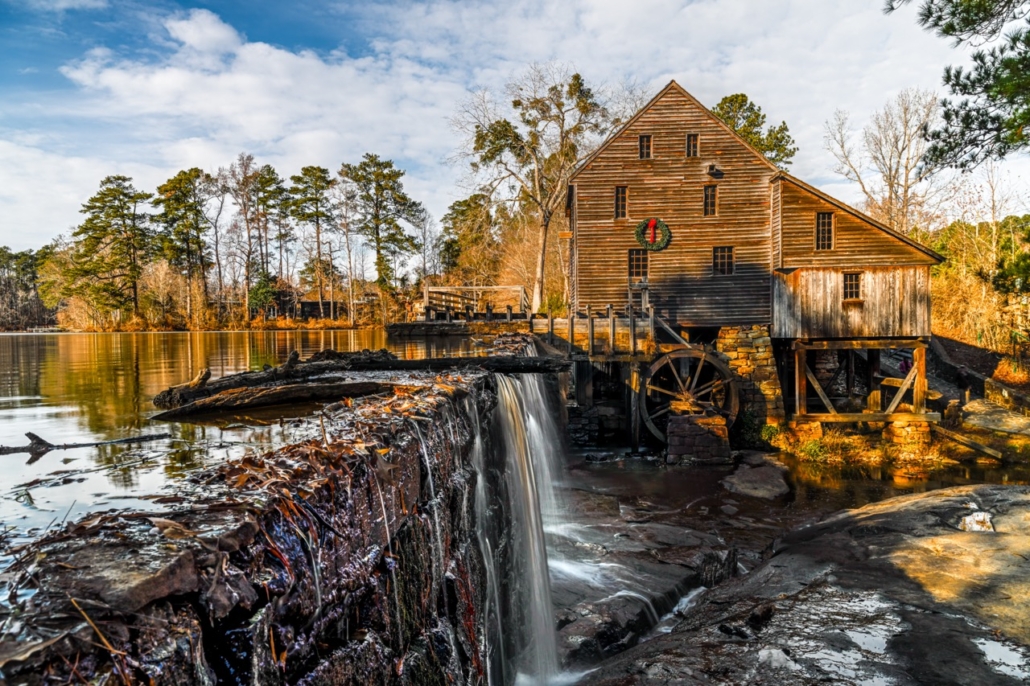Fall Plumbing Checklist: Raleigh Home Maintenance Guide
Fall Plumbing Checklist: Prepare Your Home for Cooler Weather
Raleigh Home Maintenance Guide—As autumn arrives in North Carolina, the changing leaves aren’t the only things that need attention. Your home’s plumbing system requires seasonal preparation to handle the cooler months ahead. Many Raleigh homeowners overlook fall plumbing maintenance, leading to costly repairs when winter weather strikes.
This comprehensive guide walks you through essential steps to protect your plumbing investment and avoid emergency calls during the holidays. From preventing frozen pipes to optimizing your water heater, these proactive measures will keep your system running smoothly all season long.
Fall Plumnomg Checklist: Why Fall Plumbing Maintenance Matters
Fall serves as the perfect transition period for plumbing preparation. Unlike spring cleaning, which focuses on post-winter repairs, autumn maintenance prevents problems before they start. The mild temperatures make outdoor work comfortable while giving you time to address issues before freezing weather arrives.
Recent data from the Insurance Institute for Business & Home Safety shows that burst pipes cause more than $5 billion in property damage annually. Most of these incidents occur during the first cold snap when homeowners haven’t properly prepared their systems.
 Essential Outdoor Plumbing Tasks
Essential Outdoor Plumbing Tasks
Inspect and Shut Off Outdoor Water Lines
Start your fall plumbing maintenance by examining all exterior water connections. Look for loose hose connections, cracked faucets, or signs of water damage around spigots. Even small leaks can expand dramatically when water freezes.
Locate your home’s main water shutoff valve, typically found near the street or where the water line enters your house. Test the valve to ensure it turns easily—you’ll want quick access if an emergency occurs. If the valve feels stiff or doesn’t turn completely, contact a professional plumber for replacement.
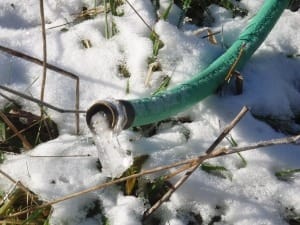
Disconnect and Store Garden Hoses
Remove all garden hoses from outdoor faucets and drain them completely. Water trapped in hoses can freeze and expand back into the faucet, causing internal damage. Store hoses in a heated garage or basement to extend their lifespan.
After disconnecting hoses, turn off the water supply to outdoor faucets if your home has separate shutoff valves. Open the outdoor faucets to drain any remaining water, then close them tightly.
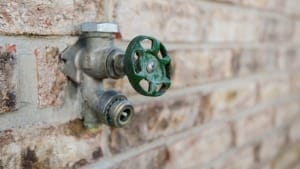
Install Faucet Covers
Insulated faucet covers provide an extra layer of protection against freezing temperatures. These inexpensive devices, available at any hardware store, slip over outdoor faucets and create a barrier against cold air.
For faucets in particularly exposed locations, consider wrapping them with pipe insulation before adding the cover. This dual protection proves especially valuable during unexpected cold snaps.
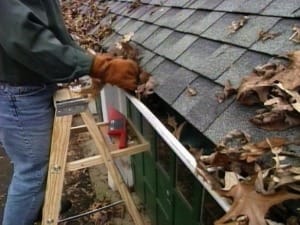 Clean and Maintain Gutters
Clean and Maintain Gutters
Clogged gutters create multiple plumbing-related problems. When debris blocks proper drainage, water can overflow and saturate the ground around your foundation. This excess moisture increases the risk of basement flooding and can damage your home’s main water line.
Remove leaves, twigs, and other debris from gutters and downspouts. Check for loose brackets or damaged sections that might need repair. Ensure downspouts direct water at least six feet away from your foundation.
Indoor Plumbing Preparation
Inspect Visible Pipes for Leaks
Walk through your home and examine all visible plumbing. Check under sinks, around toilets, and near water heaters for signs of moisture or water damage. Small leaks often worsen during temperature changes as pipes expand and contract.
Pay special attention to pipes in unheated areas like basements, crawl spaces, and garages. These locations face the highest risk of freezing and may need additional insulation.
Insulate Exposed Pipes
Pipes in unheated areas need insulation to prevent freezing. Foam pipe insulation, available in various sizes, provides effective protection at minimal cost. Simply cut the insulation to length and wrap it around exposed pipes, securing with tape if necessary.
Focus on pipes along exterior walls, in unheated basements, and in crawl spaces. Even pipes in heated areas can benefit from insulation if they run along particularly cold walls.
Test Your Sump Pump
If your home has a sump pump, fall provides the ideal time for testing. Pour water into the sump pit until the float rises and activates the pump. The pump should turn on automatically and remove the water efficiently.
Clean debris from the pit and check the discharge pipe for clogs. Consider installing a backup power source if you don’t already have one—sump pumps often fail during storms when you need them most.
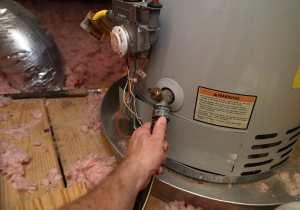
Water Heater Maintenance
Check the Temperature Setting
Your water heater works harder during cooler months as incoming water temperatures drop. Check the thermostat setting—120°F provides adequate hot water while preventing scalding and reducing energy costs.
If you have an electric water heater, you may have two thermostats that should be set to the same temperature. Gas water heaters typically have a single control dial.
Inspect for Leaks and Corrosion
Examine your water heater for signs of water damage, rust, or corrosion. Small leaks around fittings often indicate larger problems developing. Check the temperature and pressure relief valve for proper operation by lifting the test lever briefly.
Look for mineral buildup around connections and rust stains on the tank. These signs suggest your water heater may need professional attention or replacement.
Drain and Flush the Tank
Sediment buildup reduces your water heater’s efficiency and shortens its lifespan. Draining a few gallons from the tank helps remove accumulated minerals and debris.
Connect a garden hose to the drain valve at the bottom of the tank and run it to a floor drain or outside area. Open the valve and let several gallons flow out. The water should run clearer after a few minutes.
Test the TPRV (Temperature Pressure Relief Valve)
The temperature pressure relief valve prevents dangerous pressure buildup in your water heater. Test this safety device by lifting the lever briefly—water should flow from the discharge pipe. If no water flows or the valve continues running after you release the lever, replacement is necessary.
Heating System Plumbing Checks
Inspect Boiler Components
If your home uses a boiler for heating, inspect the system for leaks, corrosion, or unusual noises. Check the pressure gauge—most systems operate between 12-15 PSI when cold. Low pressure may indicate a leak somewhere in the system.
Bleed air from radiators using the small valve at the top of each unit. Air pockets reduce heating efficiency and can cause uneven temperatures throughout your home.
Check Radiant Floor Heating
Homes with radiant floor heating need special attention before the heating season begins. Test the system by raising the thermostat and monitoring for even heat distribution. Unusual cold spots may indicate circulation problems or air in the lines.
Inspect the manifold and pump for leaks or corrosion. Listen for unusual noises that might indicate pump problems or air in the system.
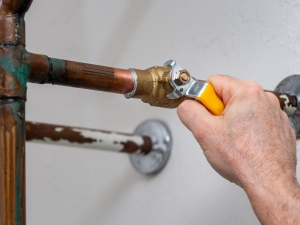 Emergency Preparedness
Emergency Preparedness
Locate Important Shutoffs
Know the location of your main water shutoff, individual fixture shutoffs, and the gas shutoff if you have gas appliances. Mark these locations clearly and ensure all family members know how to turn them off in an emergency.
Keep a water meter key or shutoff tool easily accessible. Some main shutoffs require special tools that aren’t commonly found in most toolboxes.
Prepare an Emergency Kit
Assemble a basic plumbing emergency kit containing:
- Plumber’s putty
- Pipe tape (Teflon tape)
- Rubber gaskets in various sizes
- A pipe wrench
- Flashlight and batteries
- Emergency contact numbers
Store this kit in an easily accessible location where all family members can find it.
Know When to Call Professionals
While many maintenance tasks suit DIY completion, some situations require professional expertise. Contact a licensed plumber for:
- Gas line issues
- Main sewer line problems
- Water heater installation or major repairs
- Pipe replacement or major leak repairs
- Any situation involving electrical components
Raleigh-Specific Considerations
Understanding Local Climate Patterns
Raleigh’s climate presents unique challenges for plumbing systems. The area experiences occasional hard freezes, often preceded by mild temperatures that lull homeowners into complacency. Sudden temperature drops can catch unprepared systems off guard.
Pay attention to weather forecasts and take emergency precautions when temperatures are predicted to drop below 32°F. Even brief freezing periods can cause significant damage to unprotected plumbing.
Soil Conditions and Foundation Issues
North Carolina’s clay soil expands and contracts significantly with moisture changes. This movement can stress underground pipes and foundation connections. Monitor for signs of settling or movement around your home’s plumbing connections.
Watch for soft spots in your yard that might indicate underground leaks. Clay soil often masks small leaks until they become major problems.
Creating Your Personal Maintenance Schedule
Develop a systematic approach to fall plumbing maintenance by creating a personalized checklist. Start with outdoor tasks while the weather remains pleasant, then move to indoor inspections and maintenance.
Consider scheduling professional inspections every other year, even if you handle basic maintenance yourself. Professional plumbers can identify potential problems that aren’t obvious to homeowners and provide preventive solutions.
When Professional Help Makes Sense
While many homeowners can handle basic fall plumbing maintenance, certain situations warrant professional attention. Complex repairs, gas line work, and major system modifications require specialized knowledge and licensing.
Professional plumbers also carry insurance that protects you from liability if something goes wrong during repairs. The peace of mind often justifies the cost, especially for major components like water heaters or main line repairs.
Don’t let fall plumbing maintenance overwhelm your busy schedule. The professionals at Poole’s Plumbing understand Raleigh’s unique climate challenges and can help ensure your home’s plumbing system remains reliable throughout the cooler months.
Whether you need a comprehensive system inspection, professional drain cleaning, or emergency repairs, our experienced team provides prompt, reliable service. Contact Poole’s Plumbing today to schedule your fall maintenance appointment and protect your home from costly winter plumbing problems.

